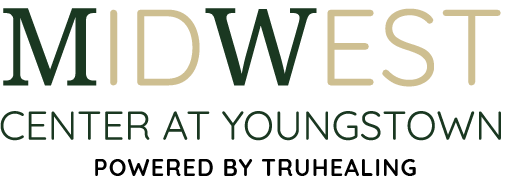Opioids are drugs either naturally derived from the opium plant or synthetically or semi-synthetically produced in labs from chemicals similar to natural opiates. The primary purpose of opioid drugs is pain relief, making these prescription drugs common among people who have had surgery, an injury, or chronic pain. Since opioids also produce feelings of relaxation and elation, they have a high potential for misuse. People who start using prescription opioids per their doctor’s orders may gradually develop a dependence. The pleasurable feelings they get from the drug tempts them to use it more frequently. Opioid addiction treatment programs can help you stop the destructive cycle of opioid abuse.
Midwest Center at Youngstown is here to help you heal from the damaging effects of opioid addiction. No matter how severe your addiction is, we know that we can help you break free with our full continuum of care. If you are interested in learning more about our evidence-based programs at our opioid addiction treatment center, reach out to us at 844.544.0502.
The 3 Most Commonly Abused Opioids
Opioid addiction can develop from prescription or recreational use. Some people believe that prescription opioids are safe because a doctor prescribes them. However, all opioids have the potential for addiction, and one should never use them without the guidance of their doctor. Below are the top three opioids that lead to addiction.
- Oxycodone
Oxycodone is classified as a Schedule II controlled substance. It is an extended-release medication used to treat moderate to severe pain. Some of the most commonly used forms of oxycodone are:
- OxyContin
- Percocet
- Roxicodone
Since oxycodone is a time-released drug, people who use it recreationally may crush the tablet and snort the powder to speed up the high. Essentially, this delivers the full dose immediately rather than gradually. Roxicodone is a rapid-release version of oxycodone, but people can also abuse it in the same way. Tablets may also be melted down or dissolved in water and injected for a rapid high.
- Hydrocodone
Hydrocodone is classified as a Schedule II controlled substance. It is prescribed for moderate to severe pain. Some well-known forms of hydrocodone are:
- Lortab
- Norco
- Vicodin
Like oxycodone, people abusing this drug may crush up and snort or dissolve and inject it for a faster, more intense high.
- Heroin
Heroin is classified as a Schedule I controlled substance since it is not used for medical purposes. It has grown in popularity with the prescription opioid epidemic. Many people who unwittingly become addicted to their prescription opioids panic when they can no longer get refills or new prescriptions for their drugs. They may go doctor shopping to find new doctors willing to write them a prescription. However, there is usually a point when they are cut off, and their addiction drives them to seek opioids illicitly. This is when many people turn to heroin. It is also easier and cheaper to access heroin than prescription opioids, making it more appealing to some.
If you or someone you know is prescribed one of the most commonly abused opioids, exercise caution and stay alert for signs of opioid abuse. Taking more than prescribed, stealing pills from others, and trying to get extra prescriptions are all indicators that a person may be abusing opioids. Encourage them to enroll in an opioid detox program to help them overcome their dependence or addiction to these powerful drugs.
Midwest Center at Youngstown: An Opioid Addiction Treatment Center You Can Count On
You do not have to allow opioid addiction to destroy your life further. Midwest Center at Youngstown is here to help you see a brighter future. Our opioid addiction treatment center in Austintown uses a holistic approach to recovery, ensuring that all areas of your health and well-being are addressed. We offer all levels of care from residential to outpatient and medication-assisted treatment to meet the needs of all of our patients. Call us today at 844.544.0502 to schedule an intake assessment.

